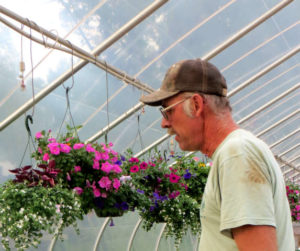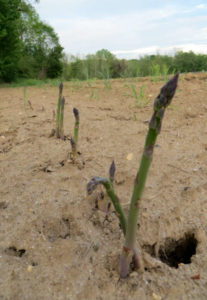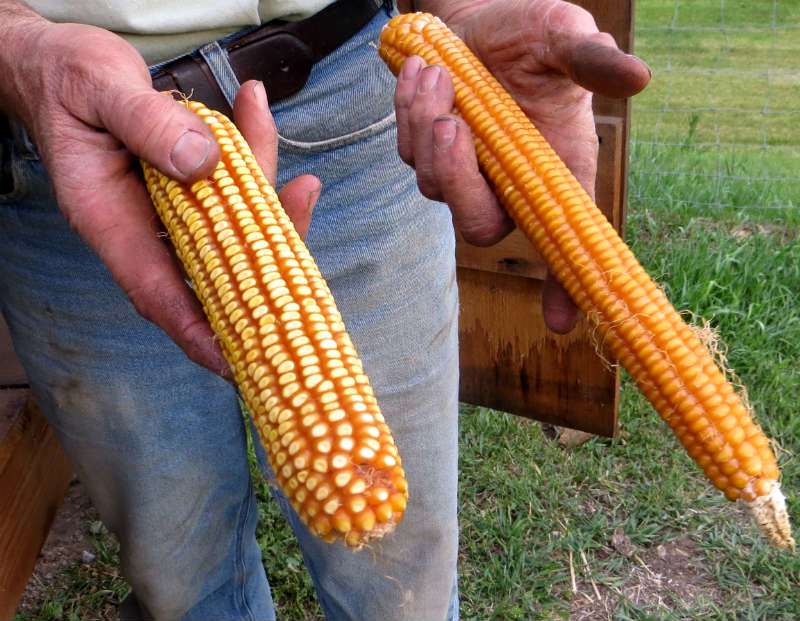Two different farmers and two different perspectives. Dale Young of Young Farms, Stanley Hayes of Hayes Dairy and Sweet Pea Cheese, and I grew up together going to church in Granby, Connecticut, a farm and Hartford bedroom community. As a kid, I didn’t know the significance of growing up with farmers, but now realize that I knew a vanishing breed–the small town New England farmer. I visited each of their Connecticut farms in mid-May.

Dale Young of Young Farms–E. Granby, Connecticut
My early connection to Young Farms was when I got to kill, pluck, and eat my first and only super fresh chicken in high school when I was visiting Dale’s sister, Janice. I remember having dreams in the middle of the night, still plucking the chicken. I don’t think it was a nightmare, but more an experience that was definitely living inside me. While Dale’s Mom and Dad worked off farm as teachers, Dale was infused with farm gene and has since made his career in farming.
Connecticut’s Mainstay Crop: Tobacco
Dale and his wife Torrie farm 75 acres of flat bottom land adjacent to Salmon Brook in East Granby, Connecticut. As a young man, he tried his hand at dairying in New York State, but he was fortunate to inherit his uncle’s farm when the bottom fell out of the dairy business. He now farms mostly vegetables, but his main money maker is tobacco with revenue at $15,000/acre. Tobacco farming is subject to the vagaries of weather, diseases, market, and popularity.
One major disease threat is blue mold, which can destroy the whole crop practically overnight. The Connecticut government agency that monitors agricultural threats indicates that blue mold has been sighted in Pennsylvania. Whether the 2012 warm winter and prevailing winds portends a blue mold invasion this summer is a wait and see game.
New England Diversified Family Farm Operation

The season’s first crop–asparagus!
It was still early in Dale’s season when I visited, but he was excited about his earliest crop–asparagus! He’s only been growing asparagus for several seasons but knows that it will sell out at $3.50/pound at the farmer’s market. Restaurants will also purchase it at a lower rate, which is not as profitable, but there is joy in featuring locally grown produce at neighborhood eateries. I rode out in the bucket of the front loader to harvest asparagus with Torrie and the dog and was mesmerized by the breadth of his operation.
Dale grows three different kinds of potatoes, multiple kinds of peppers, sweet corn, tomatoes, hard and soft wheat, and buckwheat along with many other products to round out his offerings. His Community Supported Agriculture (CSA) program, where his neighbors invest in the upcoming season’s harvest, is a model I had not seen. For a set pre-season investment in the farm, the CSA subscriber purchases whatever products he wants at the farmstand throughout the season and benefits with a 15% discount on the list price.

Dent corn on the left and heirloom flint corn on the right
Flint corn, an heirloom corn variety that traces itself back to the New England Native Americans, is another of Dale’s prized crops. He grows it to grind for cornmeal. Flint corn is a specialty crop that is substantially better than the mass-marketed cornmeal that is produced from dent corn, which is also grown for cow feed!
Dale and Torrie are content generally sticking to what they know in farming, while Stanley is exploring new opportunities in farming. But, more about Stanley next time. Check out the amazing produce at Young Farms on Route 189 in East Granby, Connecticut next time you are in the Hartford area.


looks great! when are they open? couldn’t find any information on the web…
Thanks so much for your inquiry concerning Young Farms in East Granby. Dale and Torrie Young are farmers rather than web designers, so have concentrated on what they know best — farming. They can be found at the Kent (Connecticut) Farmer’s Market on Saturdays from 9 a.m. to noon and at their own farm on Route 189 in East Granby, just north of the intersection of Holcomb Road/Floydville Road on the west side of the road, Monday through Friday from 3 p.m. to 6 p.m. and Sundays from noon until 3 p.m.
Right now they have beets, carrots, squash, sweet corn, leeks, scallions, green beans, grains (cornmeal, grits, hard white wheat & more), grape jelly, maple syrup, grape tomatoes and more. Chicken and duck eggs are also their specialty. And, of course, none are GMOs! And TOMATOES are expected in about one and a half weeks!
Torrie is excited that they are getting up to FIVE new customers a day!
Hi Kathryn.
Thanks for the blog. Everything looks great. The people are loving all the fresh vegetables. Gotta Go now. Time is awaisting.
Take Care Torrie